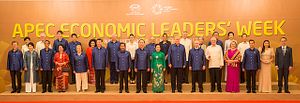Ahead of the opening of the Asia-Pacific Economic Cooperation (APEC) summit held in Vietnam, Ian Bremmer, president of the political consultancy Eurasia Group tweeted: “Every foreign leader I’ve spoken with at APEC thinks Trump presidency has been enormous gift for the Chinese.” U.S. President Donald Trump’s latest remarks in Da Nang demonstrated the reasons behind that consensus.
On November 10, in his keynote speech at the APEC CEO summit, Trump sent a clear message to the Asia-Pacific region and even to the whole world: his administration will continue its “America First” policy and the rest of the world should take care of themselves. He said:
From this day forward, we will compete on a fair and equal basis. We are not going to let the United States be taken advantage of any more. I am always going to put America first, the same way that I expect all of you in this room to put your countries first.
In blunt language, Trump even attacked the general notion of multilateral and intergovernmental trade organizations — particularly the World Trade Organization (WTO) — right in front of a group of world leaders gathered for APEC — a typical multilateral trade entity. “[W]e have not been treated fairly by the World Trade Organization. Organizations like the WTO can only function properly when all members follow the rules and respect the sovereign rights of every member,” Trump said. “What we will no longer do is enter into large agreements that tie our hands, surrender our sovereignty, and make meaningful enforcement practically impossible.”
It’s worth noting that without singling out China by name, most of Trump’s aggressive remarks — that the United State will no longer “turn a blind eye to violations, cheating, or economic aggression” or “tolerate the audacious theft of intellectual property” — were obviously aimed at China, although he claimed once again that he blamed previous U.S. administrations rather than China, or any other country, for “taking advantage of the United States on trade.”
However, Trump’s sharp criticism toward China — in sharp contrast to what he had just said during his three-day visit to Beijing — actually deepened anxiety in the Asia-Pacific region. It reaffirmed for the world that Trump is a man who will change his position and tone instantly for convenience and his own interests.
In contrast, Chinese President Xi Jinping in his keynote speech continued defending globalization, free trade, and multilateral organizations, calling for further cooperation and integration in the Asia-Pacific region, in line with what he said at the Davos World Economic Forum in January.
“China will not slow its steps in opening up itself,” Xi said. “We will work together with other countries to create new drivers of common development through the launching of the Belt and Road Initiative.”
He also promised that “all businesses registered in China will be treated as equals,” and that China will “grant more powers to pilot free trade zones to conduct reform, and explore the opening of free trade ports.”
In addition, he assured the Asia-Pacific countries that China will “stick to the path of peaceful development” and “promote the building of a new type of international relations based on mutual respect, fairness and justice, and win-win cooperation.”
No matter whether China will really abide by its promises in practice, Xi’s remarks above sounded much more appealing to the world than Trump’s striking rhetoric at the moment.
According to Christopher Johnson of the Center for Strategic and International Studies (CSIS), a Washington think tank, China was actually looking forward to the APEC gathering — an unusual sentiment for Beijing — because Beijing knew that the Trump administration has no love for multilateral trade and hence Beijing would actively promote it instead.
The latest development at the APEC summit showed that China once again made the right moves, while, unfortunately, the United States did not.

































